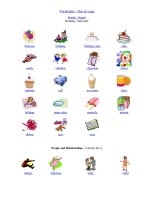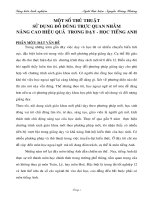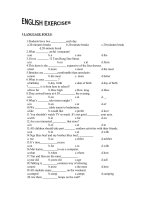bt tu vung
Bạn đang xem bản rút gọn của tài liệu. Xem và tải ngay bản đầy đủ của tài liệu tại đây (98.4 KB, 4 trang )
<span class='text_page_counter'>(1)</span><div class='page_container' data-page=1>
<b>VOCABULARY- UNIT 4</b>
1. In Britain it is ………….. for children to attend school between the ages of 5 and 16
a. enforced b. compulsory c. obliged d. made
2. The school year normally has three ………….. , with exams at the end of the year
a. terms b. semesters c. systems d. seminars
3. Primary education in the U.S is compulsory
a. free of charge b. excellent c. required d. easy
4. There are two parallel school systems in English, state school and ………….. school
a. national b. public c. primary d. secondary
5.Tom: “How do you do?” – Jerry: “……….”
a. yes, OK b. Not too bad c. How do you do? d. I’m well
6. A: “Bye!” – B: “ ………”
a. See you lately b. See you later c. Thank you d. Meet you again
7. A: “ I’ve passed my exam.” - B: “……….”
a. Good luck b. It’s nice of you to say so c. That’s a good idea. d. Congratulations!
8. A: “ Would you like to have dinner with me?” B: “ …………”
a. Yes, I’d love to b. I’m very happy c. Yes, It is d. Yes, so do I
9. Peter: “ I enjoy listening to pop music.” Mary: “………..”
a. I’m, too b. I don’t c. Neither do I d. So am I
10. Ann: “ Are you going to visit Britain next month?” Kim: “Yes,………..”
a. I am b. I do c. I like d. I going
11.Mary: “ That’s a very nice skirt you are wearing.” Julia: “ …………..”
a. That’s nice b. I like it c. That’s all right d. I’m glad you like it
12. David: “ Happy Christmas!” Jason: “ …………..”
a. You are the same! b. Same for you! c. The same to you d. Happy Christmas.
13.Tommy left high school _______ the age _______ seventeen.
a. at / of b. in / for c. on / with d. of / in
14.The academic year in Vietnam is over _______ the end _______ May.
a. from / in b. for / on c. on / in d. at / of
15.In _______ most countries, it is compulsory for children to receive primary education.
a. a b. an c. the d. Ø
16.Over _______ past few decades, _______ schools in the USA have been testing various arrangements.
a. the / Ø b. Ø / Ø c. a / the d. Ø / the
17.As an _______, Mr. Pike is very worried about the increasing of juvenile delinquency.
a. educate b. education c. educator d. educative
17.In England, primary education is provided by state schools run by the government and by _______ fee-paying
schools.
a. independent b. independently c. depended d. independence
18.The United Nations Secretary-General has often spoken of the need for individual _______ and human rights
in his speeches.
</div>
<span class='text_page_counter'>(2)</span><div class='page_container' data-page=2>
19.A/an _______ is an official document stating that you have passed an examination, completed a course, or
.achieved some necessary qualifications.
a. certificate b. requirement c. education d. test
20.Peter is trying his best to study in hope that he will _______ fame and fortune in the near future.
a. lose b. run c. move d. achieve
21._______ is the study of the events of the past.
a. Geography b. History c. Arts d. Literature
22.She was the first in her family to enjoy the privilege of a university _____.
a. schedule b. education c. science d. technology
23.English is an important _______ that is required in several national examinations:
a. language b. test c. evaluation d. subject
24._______ schooling is compulsory in Australia between _______ ages of six and seventeen.
<i>a. The / Ø </i> b. A / an c. Ø / the d. The / ah
25.The functional skills such as fundamentals of agriculture, health and hygiene and population education have
also been incorporated in the primary school _______.
a. curriculum b. project c. plan d. schedule
26.In Vietnamese schools, English, mathematics, and literature are three _______ subjects, which are compulsory
in many important national examinations.
a. core b. part c. center d. middle
<b>Read the two passages carefully and choose the correct answer</b>.
Vietnam's education system can be divided into 5 categories: pre-primary, primary, intermediate, secondary,
and higher education.
Public kindergartens usually admit children from the age of 18 months to 5 years. Children at 4 or 5 years of
age are sometimes taught the alphabet and basic math. This level of education is only popular in major cities.
Children normally start their primary education at the age of six. Education at this level lasts 5 years and it is
compulsory for all children. This compulsory education may be one of the reasons why, despite remaining a less
developed country, the literate proportion of the country's population is very high, over 90% on average.
Middle schools teach students from grade 6 to 9. This educational level is generalized throughout most of the
country - except in very remote provinces, which expect to popularize and standardize middle education fully
within the next few years. Intermediate is a non-compulsory schooling form in Vietnam.
Secondary education, which consists of grades 10, 11 and 12, is standardized in all major urban regions, but
is not in rural provinces. After 3 high school terms, all students must attend a graduation test. This test often
consists of 6 subjects differently selected each year but has to contain the 3 compulsory ones: Foreign Language
(mostly English), Mathematics and Literature. The Vietnamese government intends to merge this test with the
university entrance test in 2009.
1. Pre-primary education in Vietnam is popularized all over the country.
a. True b. False c. No information
2. Primary education is compulsory in Vietnam.
a. True b. False c. No information
3. Students from grade 6 to 9 have to take an important examination to continue their education at high school.
a. True b. False c. No information
4. Secondary education is standardized in all over the country.
a. True b. False c. No information
</div>
<span class='text_page_counter'>(3)</span><div class='page_container' data-page=3>
<b>VOCABULARY- UNIT 4</b>
1. In Britain it is ………….. for children to attend school between the ages of 5 and 16
a. enforced <b>b. compulsory</b> c. obliged d. made
2. The school year normally has three ………….. , with exams at the end of the year
<b>a. terms</b> b. semesters c. systems d. seminars
3. Primary education in the U.S is compulsory
<b>a. free of charge</b> b. excellent c. required d. easy
4. There are two parallel school systems in English, state school and ………….. school
a. national <b>b. public</b> c. primary d. secondary
5.Tom: “How do you do?” – Jerry: “……….”
a. yes, OK b. Not too bad <b>c. How do you do?</b> d. I’m well
6. A: “Bye!” – B: “ ………”
a. See you lately <b>b. See you later</b> c. Thank you d. Meet you again
7. A: “ I’ve passed my exam.” - B: “……….”
a. Good luck <b>b. It’s nice of you to say so c. That’s a good idea. d. Congratulations!</b>
8. A: “ Would you like to have dinner with me?” B: “ …………”
<b>a. Yes, I’d love to</b> b. I’m very happy c. Yes, It is d. Yes, so do I
9. Peter: “ I enjoy listening to pop music.” Mary: “………..”
a. I’m, too <b>b. I don’t</b> c. Neither do I d. So am I
10. Ann: “ Are you going to visit Britain next month?” Kim: “Yes,………..”
<b>a. I am</b> b. I do c. I like d. I going
11.Mary: “ That’s a very nice skirt you are wearing.” Julia: “ …………..”
a. That’s nice b. I like it c. That’s all right <b>d. I’m glad you like it</b>
12. David: “ Happy Christmas!” Jason: “ …………..”
a. You are the same! <b>b. Same for you! c. The same to you</b> d. Happy Christmas.
13.Tommy left high school _______ the age _______ seventeen.
<b>a. at / of </b> b. in / for c. on / with d. of / in
14.The academic year in Vietnam is over _______ the end _______ May.
a. from / in b. for / on c. on / in <b>d. at / of</b>
15.In _______ most countries, it is compulsory for children to receive primary education.
a. a b. an c. the <b>d. Ø</b>
16.Over _______ past few decades, _______ schools in the USA have been testing various arrangements.
<b>a. the / Ø </b> b. Ø / Ø c. a / the d. Ø / the
17.As an _______, Mr. Pike is very worried about the increasing of juvenile delinquency.
a. educate b. education <b>c. educator </b> d. educative
17.In England, primary education is provided by state schools run by the government and by _______ fee-paying
schools.
<b>a. independent b. independently </b> c. depended d. independence
18.The United Nations Secretary-General has often spoken of the need for individual _______ and human rights
in his speeches.
</div>
<span class='text_page_counter'>(4)</span><div class='page_container' data-page=4>
19.A/an _______ is an official document stating that you have passed an examination, completed a course, or
.achieved some necessary qualifications.
<b>a. certificate </b> b. requirement c. education d. test
20.Peter is trying his best to study in hope that he will _______ fame and fortune in the near future.
a. lose b. run c. move <b>d. achieve</b>
21._______ is the study of the events of the past.
a. Geography <b>b. History </b> c. Arts d. Literature
22.She was the first in her family to enjoy the privilege of a university _____.
a. schedule <b>b. education </b> c. science d. technology
23.English is an important _______ that is required in several national examinations:
a. language b. test c. evaluation <b>d. subject</b>
24._______ schooling is compulsory in Australia between _______ ages of six and seventeen.
<i>a. The / Ø </i> b. A / an <b>c. Ø / the </b> d. The / ah
25.The functional skills such as fundamentals of agriculture, health and hygiene and population education have
also been incorporated in the primary school _______.
<b>a. curriculum </b> b. project c. plan d. schedule
26.In Vietnamese schools, English, mathematics, and literature are three _______ subjects, which are compulsory
in many important national examinations.
<b>a. core </b> b. part c. center d. middle
<b>Read the two passages carefully and choose the correct answer.</b>
Vietnam's education system can be divided into 5 categories: pre-primary, primary, intermediate, secondary,
and higher education.
Public kindergartens usually admit children from the age of 18 months to 5 years. Children at 4 or 5 years of
age are sometimes taught the alphabet and basic math. This level of education is only popular in major cities.
Children normally start their primary education at the age of six. Education at this level lasts 5 years and it is
compulsory for all children. This compulsory education may be one of the reasons why, despite remaining a less
developed country, the literate proportion of the country's population is very high, over 90% on average.
Middle schools teach students from grade 6 to 9. This educational level is generalized throughout most of the
country - except in very remote provinces, which expect to popularize and standardize middle education fully
within the next few years. Intermediate is a non-compulsory schooling form in Vietnam.
Secondary education, which consists of grades 10, 11 and 12, is standardized in all major urban regions, but
is not in rural provinces. After 3 high school terms, all students must attend a graduation test. This test often
consists of 6 subjects differently selected each year but has to contain the 3 compulsory ones: Foreign Language
(mostly English), Mathematics and Literature. The Vietnamese government intends to merge this test with the
university entrance test in 2009.
6. Pre-primary education in Vietnam is popularized all over the country.
a. True <b>b. False </b> c. No information
7. Primary education is compulsory in Vietnam.
<b>a. True </b> b. False c. No information
8. Students from grade 6 to 9 have to take an important examination to continue their education at high school.
a. True b. False <b>c. No information</b>
9. Secondary education is standardized in all over the country.
a. True <b>b. False </b> c. No information
</div>
<!--links-->









